Maths at Eversley
Maths Legacy
At Eversley Primary School, we aim to deliver an inspiring and engaging mathematics curriculum through high quality teaching, enabling the children to be numerate, creative, independent and inquisitive. Our curriculum prepares our children to be logical and critical thinkers by providing them with rich opportunities to problem solve, reason and become fluent in number skills, all through making mathematical connections.
Our aim is for all children to leave Eversley having acquired a deep, long-term, secure and adaptable understanding of the subject, through mastering mathematical concepts and skills. Teaching for Mastery, which builds gradually as a child goes through school, is a tool for life, and immeasurably more valuable than the short-term ability to answer questions in tests or exams. This teaching approach seeks to engage and challenge pupils as well as promote confidence, enthusiasm and a sense of achievement of the subject, leaving children confident to take risks and continue to progress and achieve their full potential in life.
What is ‘Teaching for Mastery’?
Mastering maths means pupils of all ages acquiring a deep, long-term, secure and adaptable understanding of the subject. The phrase ‘teaching for mastery’ describes the elements of classroom practice and school organisation that combine to give pupils the best chances of mastering maths. Achieving mastery means acquiring a solid enough understanding of the maths that’s been taught to enable pupils to move on to more advanced material.
(National Centre for Excellence in the Teaching of Mathematics)
Elements of classroom practise and school organisation of Mathematics are based on ‘The Five Big Ideas’ which are strands that run throughout every Maths lesson. The following diagram is used to help bind these mastery ideas together:
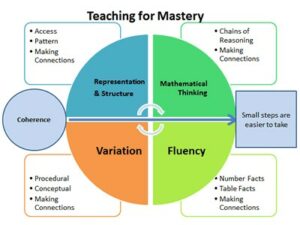
Coherence
Connecting new ideas to concepts that have already been understood, and ensuring that, once understood and mastered, new ideas are used again in next steps of learning.
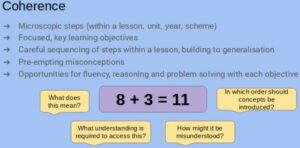
Representation and Structure
Representations used in lessons expose the mathematical structure being taught, the aim being that pupils can do the maths without recourse to the representation.
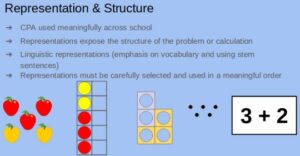
Mathematical Thinking
If taught ideas are to be understood deeply, they must not merely be passively received but must be worked on by the pupil, thought about, reasoned with and discussed with others.
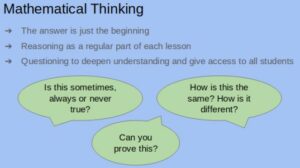
Fluency
Quick and efficient recall of facts and procedures and the flexibility to move between different contexts and representations of mathematics.
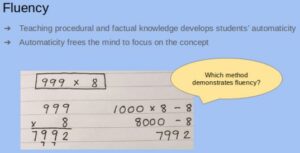
Variation
Varying the way a concept is initially presented to pupils, by giving examples that display a concept as well as those that display a non-concept. Also, carefully varying practice questions so that mechanical repetition is avoided, and thinking is encouraged.
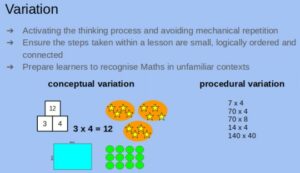
Teachers consider each element in the designing of their lessons to secure the best possible outcomes of the children. An insight into the thought process of designing a lesson can be found below:
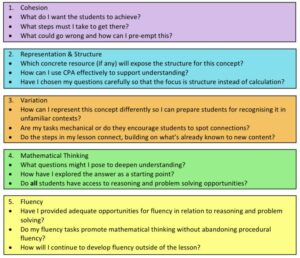
A great deal of research over many years has provided us with the knowledge of how best to teach maths. We are following research from the top performing countries across the world such as China and Singapore.
(What is Teaching for Mastery by Debbie Morgan CBE, Director of Primary Mathematics NCETM)
Resources we use at Eversley to support children with their learning
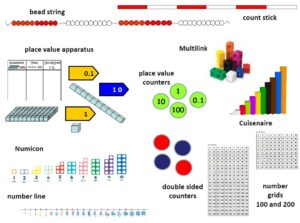
Online versions of these resources are available to help your child at home with homework or remote learning:
Digital tools | White Rose Maths
https://toytheater.com/category/teacher-tools/
https://www.didax.com/math/virtual-manipulatives.html
https://mathsbot.com/manipulativeMenu
https://play.ttrockstars.com/ttrs/resources/tools
Cultural capital
With our firm belief that knowledge is transferable, our pupils are given every opportunity to participate in a wide range of learning experiences beyond their classroom. These experiences include trips to museums, theatres, adventure centres and community projects in and around London. They are also given regular opportunities to participate in school and national competitions to encourage more positive attitudes towards Mathematics. Cultural Capital is the essential knowledge that children need to prepare them for their future success – in the world of work, in relationships forged throughout life and as a valued contributor to society. When beginning their primary school journey in the EYFS, many children arrive to school with different and sometimes more limited experiences than others. Therefore, our aim is to give children the knowledge and skills to prepare them for what comes next in their lives. This includes the relevant vocabulary needed throughout their education and the opportunity to link maths to real-world problem solving.
Please click on the links below for further information:
Times Tables Rock Stars Parent Guide
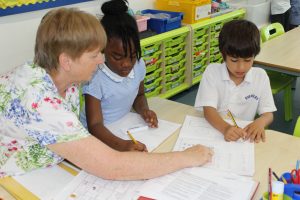
Year Group “I Can” Statements for Maths
Year 1 Number I Can Statements Other I Can Statements Year 1
Year 2 Number I Can Statements Other I Can Statements Year 2
Year 3 NumbervI Can Statements Other I Can Statements Year 3
Year 4 Number I Can Statements Other I Can Statements Year 4
Year 5 Number I Can Statements Other I Can Statements Year 5
Year 6 Number I Can Statements Other I Can Statements Year 6
Please see below some further information on Maths Calculation methods which is also designed to give pupils a consistent and smooth progression of learning in calculations across the school.
Year 1 Calculation methods for addition, subtraction, multiplication and division
Year 2 Calculation methods for addition, subtraction, multiplication and division
Year 3 Calculation methods for addition, subtraction, multiplication and division
Year 4 Calculation methods for addition, subtraction, multiplication and division
Year 5 Calculation methods for addition, subtraction, multiplication and division
Year 6 Calculation methods for addition, subtraction, multiplication and division
Year 6 Maths Resources:
English at Eversley
At Eversley Primary School, we recognise the importance of reading and writing as life skills that will open many doors for our children. We understand the significant role played by parents, teachers and support staff in supporting children to read with enjoyment, fluency and deep understanding. In working together, we strive to ensure that in writing, children are able to confidently generate, articulate and communicate their ideas and then organise them coherently for the reader. The children will be equipped with the oral communication skills they need to succeed and, when listening to others, will understand the importance of respecting and valuing the thoughts and views others may have.
Our aim is for all children to leave Eversley Primary School with a love of books and literature which will enrich their lives. We also aim for all children to have the confidence, desire and ability to express themselves effectively both orally and in their writing.
Overall, all pupils are given opportunities (click here) to develop a real love of literature and our rich literary heritage. See below some examples from the Autumn Term….
EYFS Forest School – We’re Going on a Bear Hunt..
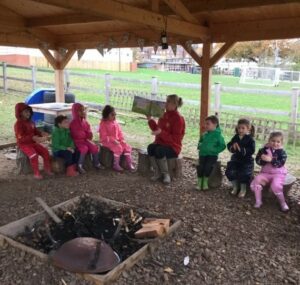
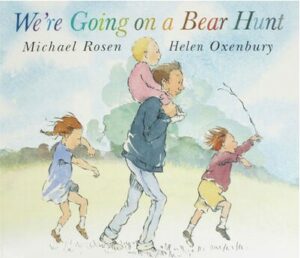
Year 5 Workshop – Romeo & Juliet
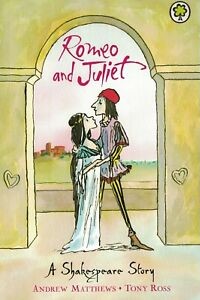
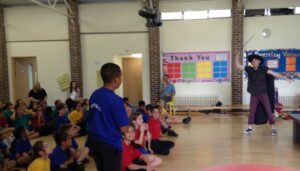
Year 6 Diary and Story Writing – Evacuee Experience & Historical Fiction Work
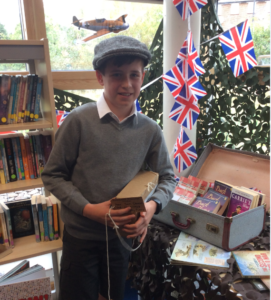


Click here to view our English Policy
Click here to view our Reading Policy
Click here to view the Reading Intention
Click here to view the Writing Intention
The Teaching of Phonics – Phonics and Early Reading
Reading at Eversley is prioritized and staff are dedicated to ensure that every child learns to read. We use the synthetic phonics Read Write Inc. programme in our Early Years and in Key Stage 1.
We use the Read Write Inc. phonics programme as soon as the children start in Reception and this continues through Year 1 and into Year 2. The teaching of this programme is a method of learning centred around letter sounds and phonics, blending them together to read and write words and using these learnt sounds in reading and writing.
The programme is highly inclusive and has a focus on teacher modelling and pupil participation. The decodable books allow children to practise and memorise their learning from phonics lessons, so that they build their accuracy, fluency and confidence with their phonics knowledge. Children benefit from being taught how to talk to a partner, speaking in complete sentences and taking turns as appropriate.
Children are assessed regularly – at least once every half term – and they are grouped according to their ability. Pupils who are struggling with decoding will be given extra support through participation in 1:1 tutoring sessions with trained members of staff.
Please click the link below for information about the Read Write Inc. phonics programme, including videos you can watch to help support your child at home.
https://www.ruthmiskin.com/parents/#lg=1&slide=2
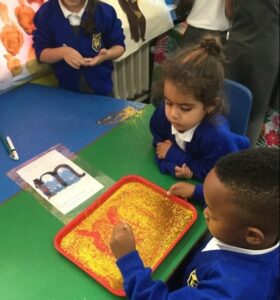
The Teaching of Reading in KS1
The Teaching of Reading in KS2
The Teaching of Handwriting (Penpals Scheme – see English Policy link above)
At Eversley, we use ‘PenPals’ to teach handwriting. This is a handwriting scheme that has clear progression through 5 developmental stages: physical preparation for handwriting, securing correct letter formation, beginning to join along, securing the joins and practicing speed, fluency and developing a personal style. Penpals is focused on whole class teaching using digital resources to enable modelling and interactive learning.
Please click the link here to view a breakdown of what is covered in handwriting.

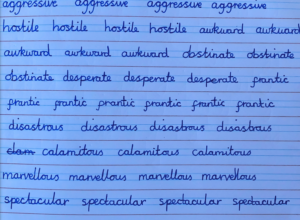
Year Group “I Can” Statements for Reading and Writing (NC coverage)
Year Group Spellings (NC coverage)
Year Group Grammar (NC coverage)
